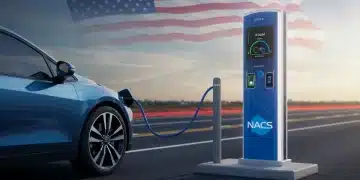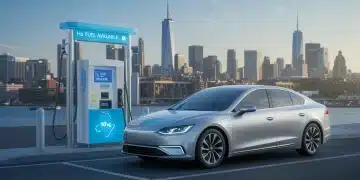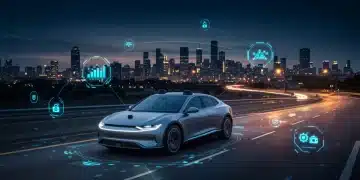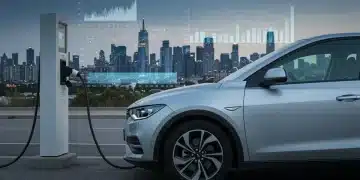Electric Vehicle Charging Standard: Industry Unites for Universal Solution by 2025
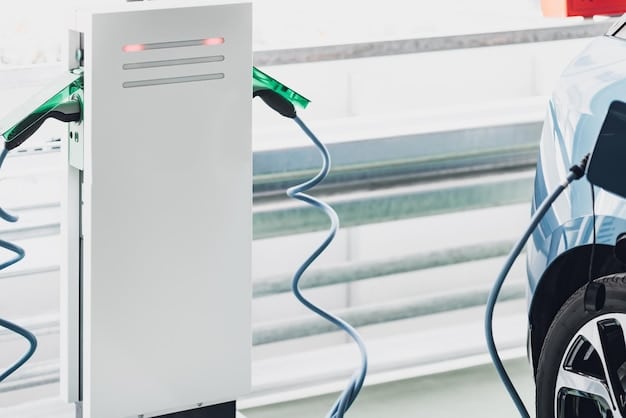
Electric vehicle (EV) industry leaders have agreed on a new universal charging standard, expected to be implemented by 2025, aiming to simplify and improve the EV charging experience for all users across the United States.
The automotive world is revving up, not just with horsepower, but with a jolt of electricity. A significant Electric Vehicle Charging Standard Update: Industry Leaders Agree on New Universal Charging Standard for All Electric Vehicles by 2025 promises a unified and simplified charging experience for EV owners across the nation.
Electric Vehicle Charging: A Unified Standard Emerges
The current landscape of electric vehicle (EV) charging is, to put it mildly, fragmented. Different connectors, varying charging speeds, and a general lack of standardization have created a frustrating experience for many EV owners. However, change is on the horizon.
Industry giants have come together to forge a consensus on a universal charging standard. This move is heralded as a major step forward in accelerating the adoption of EVs and creating a more convenient and user-friendly ecosystem.

The Current Charging Conundrum
For those new to the EV world, the complexities of charging can be daunting. Here’s a breakdown of some of the challenges:
- Connector Chaos: Different manufacturers use different connectors. Tesla uses its proprietary connector (though increasingly offering adapters), while most other EVs use CCS or CHAdeMO.
- Speed Variations: Charging speeds vary significantly depending on the charger type (Level 1, Level 2, DC fast charging) and the vehicle’s capabilities.
- Accessibility Issues: Finding a compatible and available charging station can be a challenge, especially in certain areas.
This fragmented system has been a barrier to widespread EV adoption. The lack of a universal standard creates anxiety and inconvenience for EV drivers, making them hesitant to fully embrace electric mobility.
The agreement on a universal standard aims to address these issues head-on, paving the way for a more seamless and accessible charging experience for all EV owners.
Decoding the Universal Charging Standard
While the specific details of the universal charging standard are still being finalized, the overarching goal is clear: to create a single, standardized connector type and charging protocol that all EVs can use.
This means that regardless of the make or model of your EV, you’ll be able to plug into any compatible charging station and reliably charge your vehicle.
But what does this standardization actually entail?
Key Components of the Universal Standard
The universal charging standard is expected to encompass several key elements:
- Connector Type: A single, standardized connector that all EVs will use. While the specific connector is yet to be officially selected, the Combined Charging System (CCS) is a strong contender due to its ability to handle both AC and DC charging.
- Charging Protocol: A unified communication protocol between the EV and the charging station to ensure seamless and reliable charging.
- Safety Standards: Enhanced safety measures to protect both the vehicle and the user during the charging process.
The implementation of these components will be crucial in ensuring a truly universal and interoperable charging network. Manufacturers will need to adapt their vehicle designs, and charging station operators will need to upgrade their equipment to comply with the new standard.
This agreement on a universal charging standard represents a paradigm shift in the EV industry, promising a more convenient and user-friendly charging experience.
Benefits of a Universal Charging Standard
The move towards a universal electric vehicle charging standard brings with it a plethora of advantages, impacting not only EV drivers but also the broader industry and the environment.
From enhanced convenience and reduced anxiety to accelerated EV adoption and infrastructure development, the benefits are far-reaching and transformative.
Convenience and Reduced Range Anxiety
One of the most significant benefits of a universal charging standard is the increased convenience it offers to EV drivers. No longer will they have to worry about carrying multiple adapters or searching for compatible charging stations.
Imagine a future where you can simply plug your EV into any available charging station, regardless of its brand or location, and confidently charge your vehicle. This peace of mind translates to reduced range anxiety and a more enjoyable EV ownership experience.
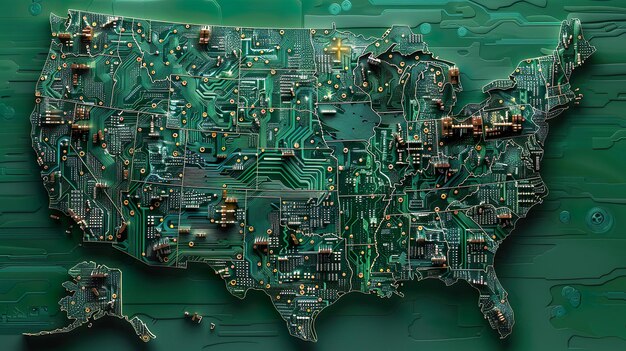
Furthermore, a universal standard will simplify cross-country travel for EV owners, allowing them to plan their journeys without the added stress of finding compatible charging stations along the way. This will undoubtedly encourage more people to consider EVs for long-distance travel.
The universal standard is a game-changer for EV drivers, offering unparalleled convenience and eliminating a major source of anxiety.
Challenges and Roadblocks to Implementation
While the agreement on a universal charging standard is a significant step forward, the road to full implementation is not without its challenges. Several hurdles must be overcome to ensure a smooth and successful transition.
These challenges range from technological compatibility and infrastructure upgrades to regulatory frameworks and consumer education.
Retrofitting Existing Infrastructure
One of the biggest challenges will be retrofitting existing charging infrastructure to comply with the new standard. This will require significant investment from charging station operators, as they will need to upgrade or replace existing chargers to support the universal connector.
Furthermore, ensuring compatibility with older EV models that may not be equipped to handle the new charging protocol will be crucial. Adapter solutions or software updates may be necessary to bridge the gap between legacy vehicles and the new standard.
- Financial Burden: Upgrading charging stations can be expensive, requiring significant capital investment.
- Technological Compatibility: Ensuring seamless integration with existing infrastructure and older EV models is essential.
- Phased Implementation: A gradual and well-planned rollout is necessary to avoid disruptions and ensure a smooth transition.
Overcoming these challenges will require collaboration between industry stakeholders, government agencies, and technology providers. A well-coordinated and strategic approach is essential to ensure a successful implementation of the universal charging standard.
The Role of Government and Policy
Government policies and regulations play a crucial role in shaping the EV charging landscape and facilitating the adoption of a universal charging standard. Supportive policies can incentivize infrastructure development, promote standardization, and accelerate the transition to electric mobility.
These policies can take various forms, including tax incentives, subsidies, and regulatory mandates.
Incentivizing Infrastructure Development
Government incentives can encourage charging station operators to invest in upgrading their infrastructure to comply with the universal standard. Tax credits, grants, and subsidies can help offset the cost of upgrading or replacing existing chargers, making it more financially viable for operators to adopt the new standard.
Furthermore, government policies can promote the deployment of charging stations in underserved areas, ensuring that all communities have access to reliable and convenient EV charging.
- Tax Credits: Offering tax credits for upgrading or installing universal charging stations.
- Subsidies: Providing direct financial assistance to charging station operators.
- Zoning Regulations: Streamlining the permitting process for charging station installations.
Government support is essential in creating a robust and equitable EV charging network that supports the widespread adoption of electric vehicles.
What This Means for Consumers
The advent of a universal EV charging standard has significant implications for consumers, both current and prospective EV owners.
From increased convenience and reduced costs to greater confidence and peace of mind, the benefits are numerous and transformative.
Simplified Charging Experience
For EV owners, the universal charging standard translates to a simplified and stress-free charging experience. No more worrying about connector compatibility or searching for specific charging networks.
Imagine a future where you can simply plug your EV into any available charging station, regardless of its brand or location, and confidently charge your vehicle. This convenience will undoubtedly encourage more people to consider EVs as their next vehicle.
The universal standard will also make long-distance travel in an EV more enjoyable, as drivers can plan their routes without the added stress of finding compatible charging stations along the way.
- Increased Convenience: One connector for all EVs.
- Reduced Costs: Lower adapter costs and competitive charging rates.
- Enhanced Confidence: Peace of mind knowing you can charge anywhere.
The universal charging standard is a win-win for consumers, offering a more convenient, affordable, and reliable EV ownership experience.
The Future of Electric Vehicle Charging
Looking ahead, the future of electric vehicle charging is bright, with ongoing innovations and advancements promising to further enhance the EV ownership experience.
From wireless charging and ultra-fast charging to smart charging and vehicle-to-grid (V2G) technology, the possibilities are endless.
Wireless Charging Technology
Wireless charging technology is rapidly evolving, offering a convenient and hands-free way to charge EVs. Imagine simply parking your EV over a charging pad and automatically initiating the charging process.
This technology has the potential to revolutionize EV charging, eliminating the need for cables and connectors. Wireless charging could be integrated into parking spaces, roadways, and even homes, making EV charging seamless and ubiquitous.
The future of EV charging is dynamic and innovative, with ongoing advancements promising to further enhance the convenience, efficiency, and sustainability of electric mobility.
| Key Highlight | Brief Description |
|---|---|
| ⚡ Universal Standard | All EVs can use the same charging stations, simplifying the process. |
| 🛣️ Long Trips Easier | Plan routes without worrying about specific charging needs. |
| 💰 Cost Savings | Potentially lower charging costs due to increased competition and convenience. |
| 🌍 Eco-Friendly | Encourages EV adoption, leading to reduced emissions and a greener environment. |
FAQ: Universal EV Charging Standard
▼
A universal EV charging standard is an agreement on a single connector type and charging protocol that all electric vehicles can use, regardless of the manufacturer or model.
▼
Industry leaders have agreed to implement the new universal charging standard by 2025, although the exact timeline may vary depending on infrastructure upgrades and regulatory approvals.
▼
While the final decision is yet to be made, the Combined Charging System (CCS) is a strong contender due to its ability to handle both AC and DC charging.
▼
Charging station operators will need to upgrade or replace existing chargers to support the universal connector. Government incentives and subsidies may be available to help offset the costs.
▼
EV owners will enjoy a simplified charging experience, reduced range anxiety, lower costs, and greater confidence knowing they can charge their vehicle anywhere.
Conclusion
The agreement on a universal EV charging standard marks a pivotal moment in the electric vehicle revolution. By simplifying the charging process and fostering greater interoperability, this initiative promises to accelerate EV adoption, reduce range anxiety, and pave the way for a more sustainable transportation future. As we move closer to 2025, the collaborative efforts of industry leaders, government agencies, and technology providers will be crucial in ensuring a seamless and successful transition to a unified charging ecosystem.

